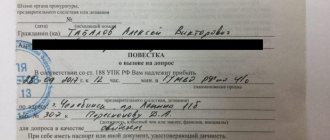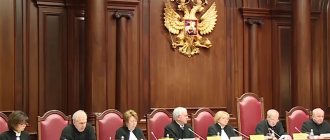The investigator is inactive - go to court
A complaint about the inaction or unlawful behavior of the investigator may be filed with the Investigative Committee. This authority is obliged to organize an investigation into the fact of the complaint and hold the perpetrators accountable. When faced with the indifference or incompetence of the head of the investigative agency, more radical measures need to be taken. An appeal will bring results if you write a statement addressed to the prosecutor.
“An appeal against the actions of an investigator can be carried out if there are compelling reasons and substantial evidence of violations during the investigation of a criminal case. A complaint against the actions of the investigator is submitted to the Investigative Committee, prosecutors, and courts. Before drawing up this document, you should familiarize yourself with its sample,” advises criminal lawyer Roman Maksimovich.
The prosecutor's office performs a supervisory function and monitors compliance with the law by officials; it does not have the right to refuse to consider a complaint. Three days are allotted for this; in exceptional cases, the period can be extended to 10 days. The prosecutor has the authority to fully or partially satisfy the request, as well as refuse it. In this case, you should go to court.
“It is possible to send a complaint to the district court, which is in charge of the preliminary investigation. If there are several of them, then the complaint is submitted, in accordance with the decision of the Supreme Court, to the authority at the location of the person under investigation. It can be either delivered in person or sent by mail,” says criminal lawyer Roman Maksimovich.
When delivering the complaint in person or to the office, demand that they give you a copy or a second copy, if you have prepared one, of the accepted complaint with a signature, a transcript of the person who accepted the complaint, date and seal. This method is the most effective because there are deadlines established by law, and the appeal will not have time to get lost in numerous offices, as often happens when filing a complaint with the Investigative Committee and the prosecutor's office.
“According to the law, the consideration of the complaint takes place in an open court. The presence of all interested parties is required, that is, in addition to you or a representative, the investigator against whose actions the complaint was filed must be present at the meeting. During the review process, the court has the right to either recognize the appealed actions as unlawful or refuse to satisfy the complaint,” says criminal lawyer Roman Maksimovich.
To the Head of the Main Directorate of the Ministry of Internal Affairs of Russia for the Moscow Region
Major General of Justice
Voronin A.V.
From: Ivan Ivanovich Ivanov, resident: _________________________________
(T. ________________)
COMPLAINT
on the actions of employees of the Investigative Directorate of the Ministry of Internal Affairs of Russia for the Ivanovo region
The Investigative Directorate of the Ministry of Internal Affairs of Russia for the Ivanovo district opened a criminal case against me No. 00000 under Part 2 of Art. 165 of the Criminal Code of the Russian Federation. The reason and basis for initiating the case was the statement of Petrov I.I. that I allegedly did not fulfill the agreement. At the same time, these accusations against me are unfounded.
The investigation of the criminal case is one-sided and clearly ordered. The investigation, for the sake of Petrov I.I. carries out procedural actions with numerous violations, putting pressure on me.
Back on March 7, 2015, I was interrogated by Art. Investigator of the Investigative Directorate of the Ministry of Internal Affairs of Russia for the Ivanovo district Merzlikina Yu.Yu. During the interrogation, I explained that I had previously fulfilled contracts several times.
On the day of execution of the last contract, Petrov I.I. repeatedly insulted me. We had a quarrel with him. After this quarrel, Petrov I.I. ended any relationship with me.
It was after the above-mentioned quarrel that Petrov I.I., based on his vindictive and malicious motives, slandered me. At the same time, apparently, he provided the investigation with certain payment documents allegedly received from me. In addition, he (I.I. Petrov) persuaded Tatyana, an employee dependent on him, to slander me.
Unfortunately, the funds to Petrov I.I. were always transferred in cash, and as a rule in the absence of witnesses. Taking advantage of this circumstance, Petrov I.I., without going to a civil court, without presenting me with any material claims, using his connections in law enforcement agencies, organized the persecution of Man and my family.
- March 07, 2015 Art. Investigator of the Investigative Directorate of the Ministry of Internal Affairs of Russia for the Ivanovo District, Merzlikina, contrary to sound logic and the requirements of the law, detained me. I ended up behind bars, despite the fact that I am a citizen of the Russian Federation, have no previous convictions, I have a wife and 2 minor children. One child is six months old - his wife is breastfeeding him and a nervous breakdown could lead to loss of breast milk. The crime of which I am unfoundedly accused is not serious, but the investigation is “charged” to break me and my family. The investigator appealed to the court to choose detention for me as a preventive measure. However, the court refused to satisfy the investigator's request.
- During the confrontation between me and Petrov I.I., March 8, 2015, Petrov I.I. repeatedly raised his voice at me and threatened me with his corrupt connections.
- On March 7, 2015, employees of the Investigative Directorate of the Ministry of Internal Affairs of Russia for the Ivanovo District conducted a search in the apartment at the address: ________. It is currently unknown whether any items were seized during the search. The search was carried out with numerous violations at night. Any resolution of the investigator to conduct a search of Ivanova A.A. – my wife, was not presented (no information about the decision).
In violation of paragraph Art. 182 of the Code of Criminal Procedure of the Russian Federation, the search was carried out by operational officers (no data on names), without court approval. In violation of paragraph 15 of Art. 182 of the Code of Criminal Procedure of the Russian Federation, a copy of the search protocol was not handed to A.A. Ivanova. Currently, the search in my apartment is being appealed to the courts.
- March 07, 2015, Art. Investigator of the Investigative Directorate of the Ministry of Internal Affairs of Russia for the Ivanovo district Merzlikina, the car was illegally and unreasonably seized - LIFAN 00000000. According to Part 2 of Art. 115 of the Code of Criminal Procedure, seizure consists of a prohibition addressed to the owner or possessor of property to dispose and use it. However, at present, a loan is being paid for the above vehicle to CB “Horns and Hooves” under loan agreement No. ________ dated _________. In fact, the car is pledged. At the same time, the agreement was concluded between the above-mentioned bank and Ms. A.A. Ivanova. Thus, Ivanov I.I. has nothing to do with the vehicle, he is neither the owner nor the owner of the car.
According to Part 3 of Art. 115 of the Code of Criminal Procedure of the Russian Federation, seizure may be imposed on property located in the possession of other persons if there are sufficient grounds to believe that it was obtained as a result of the criminal actions of the suspect... However, as stated in paragraph 3 of this complaint, the vehicle was purchased on credit, which until now not paid in full. This fact excludes the possibility of acquiring seized property as a result of the “criminal actions” of the accused. In addition, part 3 of Art. 115 of the Code of Criminal Procedure of the Russian Federation summarizes the fact of obtaining property as a result of criminal actions, however, the above property - a car - has NOT yet been received, because is pledged to the bank.
The seizure protocol dated March 7, 2015 contains inaccurate information about the ownership of the vehicle LIFAN 000000000 by Ivanov I.I.
A report of the inspection of the scene of the incident was not drawn up, which indicates the lack of evidentiary value of the car and its contents.
Petrov I.I. To date, he has not filed any claims, but the investigative authorities, anticipating these actions, seized the property.
The protocol on the seizure of property was issued with numerous violations, in particular, a copy of the protocol of Ivanova A.A. has not been delivered to date.
The investigative authorities do not burden themselves with even the slightest compliance with the requirements of the law. In particular, part 3.1 of Art. 80 of the Federal Law “On Enforcement Proceedings” DIRECTLY prohibits the seizure of pledged property. “The seizure of the pledged property in order to secure the claim of a claimant who does not have an advantage over the pledgee in satisfying the claims is not allowed.” However, the investigative authorities are guided by other laws, namely the laws of Petrov I.I.
Ivanova A.A. has two minor children, one of whom is 5 months old (breastfed). The lack of a vehicle does not allow you to comfortably raise children. In particular, trips to the children's clinic, shopping, etc. have become difficult. Ivanova A.A. who has nothing to do with criminal case No. 000000, together with her young children, became hostage to permissiveness and arbitrariness on the part of the investigative authorities.
- As a result of the vindictiveness and meanness of I.I. Petrov, as well as the permissiveness and disregard of the law on the part of the investigative authorities of Ivanovsk, my wife had a severe nervous breakdown. As a result, her breast milk stopped, which put the life and health of her six-month-old baby at risk. I myself am also on the verge of a nervous breakdown, I’m afraid to leave the apartment. My health is compromised - I am currently ill.
- On the part of Petrov I.I. in fact, there is an outright extortion of money from me. With the help of law enforcement agencies, Petrov I.I. replaced civil legal relations with criminal procedural ones. As indicated earlier, Petrov I.I. did not bring any claims against me, knowing the terms of the contracts and knowing that these contracts were fulfilled by the parties. He understood the futility of going to a civil court with any demands on me. And he found a way to express his hatred and hostility towards me through extrajudicial, illegal means.
On the basis of the above,
ASK
1. Request from the Investigative Directorate of the Ministry of Internal Affairs of Russia for the Ivanovo District the materials of criminal case No. 00000.
2. Conduct an internal investigation into the facts stated in this complaint.
3. Oblige the Investigative Directorate of the Ministry of Internal Affairs of Russia for the Krasnogorsk region to return the vehicle LIFAN 000000000 belonging to A.A. Ivanova.
4. Stop the criminal case against me.
5. Conduct a check against I.I. Petrov. on the fact of extorting money from me for the purpose of enrichment and initiate a criminal case against him.
Who should carry which statement?
This document will help you understand what types of issues are handled by different law enforcement agencies and where is the best place to take a report if you need help. Most often, the police can help a citizen, but there are cases when going to the police can be not only pointless, but also harmful.
In order for your application to be considered quickly, the most reliable way is to contact the correct law enforcement agency and its correct division. The correct law enforcement agency (police, court, Investigative Committee, prosecutor's office) is determined by competence (investigative jurisdiction). The correct department is according to the rules of territoriality (the place where the incident occurred that you want to report or the place where you live).
Table of contents
general information
Competence of law enforcement agencies
Investigative Committee of Russia
Police
Court
General supervision in the prosecutor's office
Territoriality: which specific department of law enforcement agency should I contact?
general information
If you have become a victim or witness of an offence, it is extremely important to identify the competent government authority authorized to make decisions regarding your problem. Of course, if you contact the wrong address, your appeal should not be ignored and within 7 days from the date of registration (if you report a crime - 3 days) will be transferred to the appropriate authority or official. However, filing an application immediately with the competent authority has obvious advantages (see instructions “How and where to file a crime report”).
If your application contains information about the commission of a conditionally “everyday” administrative offense, such an application in most situations is submitted to the police (for more details, see Article 28.3 of the Code of Administrative Offenses of the Russian Federation). Within the limits of his powers, a prosecutor can also initiate proceedings in a case of an administrative offense (Article 25.11 of the Code of Administrative Offenses of the Russian Federation). Moreover, when exercising supervision over compliance with the Constitution of the Russian Federation and the execution of laws, the prosecutor has the right to initiate a case for any administrative offense (Part 1 of Article 28.4 of the Code of Administrative Offenses of the Russian Federation). In other words, based on your application, the prosecutor can initiate any case of an administrative offense (see the instructions “How to write a statement to the police”).
Competence of law enforcement agencies
The following competence has been established for the investigation of the most common crimes.
Investigative Committee of Russia:
1) causing serious harm to health;
2) kidnapping;
3) crimes against sexual integrity and sexual freedom of the individual;
4) crimes against the constitutional rights and freedoms of man and citizen;
6) a number of environmental crimes;
7) inciting hatred or enmity, as well as crimes of an extremist nature;
 crimes of exceeding official powers or their abuse, bribes and official forgery;
crimes of exceeding official powers or their abuse, bribes and official forgery;
9) crimes against government officials;
10) grave and especially grave crimes committed by minors and against minors.
Police
1) causing harm to health of varying severity;
2) crimes against property (theft, fraud, robbery, theft and others);
3) hooliganism;
4) violation of traffic rules and operation of technical equipment;
5) along with the Federal Drug Control Service (FSKN), investigates cases related to the manufacture and distribution of drugs.
Court
The current criminal procedure legislation provides for the possibility of private prosecution. In this case, the magistrate, at the request of the citizen, initiates a criminal case. In this case, the applicant independently carries out the prosecution and proves the guilt of another citizen in committing a crime.
In total, the criminal code provides for three elements of crime, the charges for which are private: beatings, intentional infliction of slight harm to health and slander. You can find out more about the procedure for private prosecution here.
General supervision in the prosecutor's office
The Prosecutor's Office of the Russian Federation is a unified federal centralized system of bodies that supervise compliance with the Constitution of the Russian Federation and the implementation of laws in force on the territory of the Russian Federation.
Any appeal or complaint about non-compliance with legislation by any government body can be submitted to the prosecutor's office. The only exception is the court.
The main functions of the prosecutor's office:
– supervision over the implementation of laws by government agencies and private legal entities;
– supervision over the observance of human and civil rights and freedoms;
– supervision over the implementation of laws by bodies carrying out operational investigative activities, inquiry and preliminary investigation;
– supervision over the implementation of laws by bailiffs;
– supervision over the implementation of laws by the administrations of bodies and institutions executing punishment and applying compulsory measures prescribed by the court, administrations of places of detention and detention;
– criminal prosecution in accordance with the powers established by the criminal procedural legislation of the Russian Federation;
– coordinating the activities of law enforcement agencies to combat crime.
Thus, we can conclude that among all law enforcement agencies, the prosecutor's office is the most "universal" in terms of upholding the law, however, it is important to remember that the prosecutor's office does not have the power to initiate criminal cases.
Territoriality: which specific department of law enforcement agency should I contact?
Territorial jurisdiction in criminal cases is determined, as a rule, by the place where the act containing signs of a crime was committed (Article 152 of the Criminal Code of the Russian Federation). This means that the application must be submitted to the appropriate authority operating in the territory in which the crime was committed. Territorial jurisdiction in cases of administrative offenses is also determined by the place where the offense was committed.
If you file a statement about a crime, there is a certain jurisdiction among law enforcement agencies, provided for in Article 151 of the Code of Criminal Procedure of the Russian Federation (see - competence).
If the place where an administrative offense or crime was committed is within the jurisdiction of one police department, and the application is filed on the territory of another department, then all available materials, after registration, are transferred to the required authority. At the same time, the necessary measures are taken to preserve traces of the offense or crime.
Examples:
- You contacted the police department with a statement in which they reported that a traffic police officer demanded a bribe from you in the amount of 1,000 rubles. In this case, the police are obliged to accept and register your statement, but within 3 days it will be forwarded to the Investigative Committee of Russia.
- Let's assume you live in the Central district of St. Petersburg. Leaving the office where you work, located in the Nevsky district, you discovered that the windshield of your car was broken. If you report this to the Central Police Department, which is located next to your home, the police will be required to register such a statement and forward it to the Nevsky Police Department, since that is where the offense was committed.
Advice
Most of the crimes that citizens encounter in everyday life are investigated by police officers. Therefore, if something was stolen from you, your relative was kidnapped, or your health was harmed, contact the police department. At the same time, it is much more important to promptly contact any nearest department so that the criminal is detained in hot pursuit than to look for the correct jurisdiction.
Important: the only exception is Article 286 of the Criminal Code of the Russian Federation - abuse of official power if you suspect a police officer of committing a crime. In such a situation, you must contact the Investigative Committee of Russia directly.
How to write a statement to the police?
What to do if the police report is not accepted?
Sample act Sample application
Return to help section
Organization of reception of citizens
In the central office of the Investigative Committee of the Russian Federation (hereinafter referred to as the Investigative Committee), the reception of citizens, representatives of state and public organizations and other persons is carried out by the heads of the main directorates, departments, departments and their deputies according to the schedule approved by the Chairman of the Investigative Committee of the Russian Federation (hereinafter referred to as the Chairman of the Investigative Committee ).
At a personal reception, a citizen must present a document proving his identity.
If necessary, the head of another main board, department, department of the Investigative Committee or his deputy, whose competence includes consideration of the applicant’s appeal, may be involved in the reception of a citizen.
Reception of citizens by the Chairman of the Investigative Committee is carried out on appeals that were resolved by his deputies and the head of the department of personal security, physical protection and official checks, and by the Deputy Chairman of the Investigative Committee - on appeals that were resolved by the heads of the main directorates, directorates, departments, heads of independent departments of the central apparatus of the Investigative Committee committee.
A personal reception of citizens by the Chairman of the Investigative Committee can also be organized on his behalf.
In the central office of the Investigative Committee, officials of the department for consideration of citizens' appeals and documentation support, authorized to organize the reception of citizens, issue directions to citizens for reception, coordinate and report information about the time and place of their reception by officials of the Investigative Committee. If there are no grounds for admitting citizens, the Investigative Committee provides applicants with explanations of where and in what order they should apply. Where necessary, written requests are accepted and sent for consideration, including to subordinate investigative bodies of the Investigative Committee.
When citizens repeatedly appeal to the same problems or their disagreement with decisions previously made in the main departments, departments and departments of the central apparatus of the Investigative Committee, authorized officials of the department for consideration of citizens' appeals and documentation support, if necessary, discuss the issue of accepting citizens as Deputy Chairman of the Investigative Committee committee or directly by the Chairman of the Investigative Committee, employees of the staff of the Chairman of the Investigative Committee or assistants to the Deputy Chairman of the Investigative Committee.
Reception of citizens at the Investigative Committee and its investigative bodies is carried out throughout the working day according to a schedule that is approved by the head of this body and must be posted in a place accessible to citizens.
The heads of the investigative bodies of the Investigative Committee receive citizens at least once a week. The decision on the appeal is made and the response to it is given by the head of the investigative body of the Investigative Committee, to whom the applicant addressed at a personal reception.
The head of the investigative body of the Investigative Committee, at a personal meeting, has the right to refuse a citizen to further consider the appeal if he was previously given an answer on the merits of the questions raised in the appeal with an explanation of the appeal procedure.
Registration of reception is carried out in special cards or a citizen registration book, which reflects a summary of the issues raised by the applicant, as well as the oral answer given to him or the preliminary decision made.
Applications submitted at a personal reception are marked with Fr.
In the premises of the Investigative Committee and in the buildings occupied by its investigative bodies, boxes “For appeals and applications”* are installed, which are placed in places accessible to applicants.
Correspondence from the boxes is removed daily by specially appointed employees. Appeals are stamped “From the box for appeals and applications”, the date of collection is indicated, after which they are transferred for registration and consideration.
When can they be summoned for questioning by the Investigative Committee?
The Investigative Committee is summoned to testify. This can happen in several cases.
Conducting an inspection - a criminal case has not yet been initiated, but information on the received statement of crime is being verified.
How does this happen
The investigator calls for explanations.
This is not yet an interrogation, and attendance is not strictly required. But it is better not to ignore this meeting, but to prepare and give the most necessary information. You can also include the evidence base. Perhaps this will all end. Interrogation - carried out when a criminal case has already been initiated. That is, an inspection was carried out and signs of a crime were identified. This means that everything is already very serious.
How does this happen
They are summoned for questioning by subpoena, but they can call and set a date and time to appear.
The most reasonable thing is to give your consent and come, always with a lawyer. Otherwise, they can come home, to work and take you to the investigator. In this case, there will be no time either to call a lawyer or to prepare for the conversation. What needs to be clarified in any case: who is being called in for questioning - a witness or a suspect. Each of them has their own rights.
For example, a suspect is required by law to have a lawyer, but a witness is not required to have one. A suspect may refuse to testify in the absence of a lawyer, but a witness does not have the right to do so.
Just because you've been called as a witness doesn't mean you can relax. The status can be changed to suspect if during the interrogation the investigator sees signs of a crime in the actions of the witness. And a witness has much less rights than a suspect.
Often, investigators call a person as a witness, conduct an interrogation, as a result of which he becomes a suspect.
If you are summoned for questioning, contact a lawyer immediately.
How to attract an investigator
As usual, if you are faced with a biased attitude on the part of the investigator, the next address where lawyers advise you to contact is the prosecutor’s office. A complaint to the prosecutor's office about inaction, as well as a refusal to initiate a criminal case based on the inspection materials, may have an effect. Not often, but it happens. However, most likely, a citizen who filed a complaint with the prosecutor’s office will have to become a participant in a new round of confrontation, now between the prosecutor’s office and the investigator.
“It often happens in practice that such a confrontation between the supervisory authority and the investigative body takes the form of “back and forth,” as people say. In other words, red tape in modern office work and document flow in authorities has not gone away,” says lawyer Alexander Shvetsov.
If you have already encountered a similar situation, do not despair. What to do to find a way out? One of the ways to restore your right and, if there are signs of a crime, for the authorities to decide to initiate a criminal case, is to submit an application to the court for compensation for violation of a reasonable period for conducting an investigative check.
“For example, a decision was made to refuse to initiate a criminal case. The prosecutor's office or the court cancels it and establishes the fact of inaction of the official who conducted the inspection at the request of the victim. And these grounds in court can be evidence that there is red tape on the part of the authorities conducting the investigation, among other things,” says lawyer Alexander Shvetsov.
A citizen has the right to receive monetary compensation if the court finds that the timing of the investigation based on the application materials was unreasonable. Moreover, if a refusal decision was issued based on the results of an inspection, and the citizen’s application indicated an act that fits the criteria of a criminal offense, and the judge determines this, the case will move forward.
“As a rule, such claims are isolated in nature, but nevertheless such a right is provided for by law. However, it is worth remembering that if the Ministry of Internal Affairs system receives a lawsuit against itself, then the authorities will probably be notified about this, and as a result, the subject of the citizen’s application will already be considered in higher offices of the ministry,” says the lawyer Alexander Shvetsov.
Of course, this method is not a panacea for all refusals of your application, and it is often difficult to prove red tape. But there is always a chance. If you are sure that a crime has been committed against you, and the authorities that are supposed to directly fight crime and carefully examine every relevant illegal action are instead shirking their job, go to court!
How to submit an application to the investigative committee
You can submit an application to the investigative committee about fraud either in person or electronically. There are online reception desks on the websites of each regional department of the Main Investigative Committee of the Russian Federation. There you can leave your appeal and attach graphic or text files to your application.
It is important that the online message must be up to 5 thousand characters without spaces, and attached files must be up to 5 MB in size.
When drawing up an electronic application to the investigative committee, you must indicate your full name, email address, type of activity, and also enter the code from the picture (to protect against robots).
An electronic application is considered on a general basis, as it has the force of a printed application.
How to prepare for interrogation
So, you have found out your status. If the investigator calls by phone, then you need to get as much information as possible: who is calling, last name, first name, patronymic, position, where you are being called, on what issue, what specifically interests the investigator. Sometimes a talkative investigator can provide the necessary information, and for a lawyer this is useful information.
Assess the reliability of the counterparty and reduce commercial and tax risks
A summons for questioning is a reason to immediately contact a lawyer. Not 15 minutes before the interrogation, but at least a day before. During this time you need to carefully prepare:
- It is best to think through your position in writing. Remember all the nuances: dates, names, place, deadlines, etc. You can use recordings during interrogation; this is permitted.
- View documents related to the case: contracts, acts, bank account statements, etc.
- Analyze declarations of accrued taxes, the fact of payment, in case of late payment - the reasons that led to this.
- If the matter concerns non-payment of wages, identify the reasons that led to this. It is possible to prepare a plan in advance and voice it during interrogation.
- Go through all possible options for the development of further events and try to find a way out. Adhere to the same position (thought out in advance) during interrogation.






